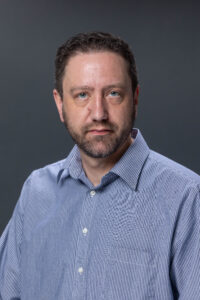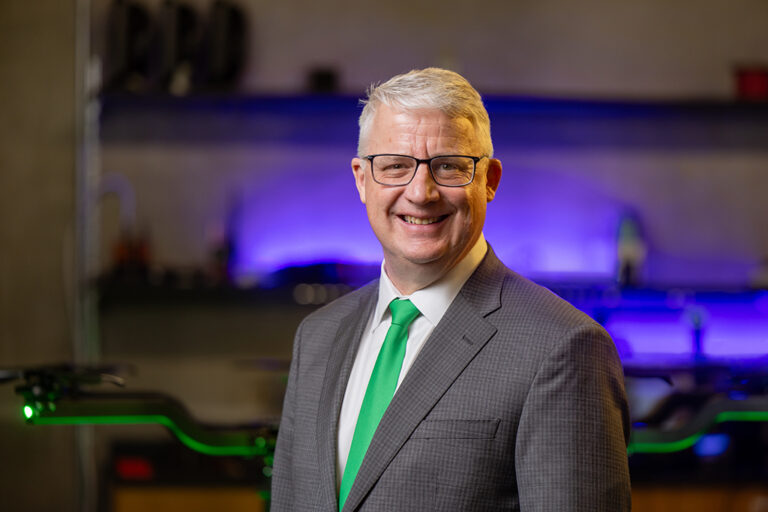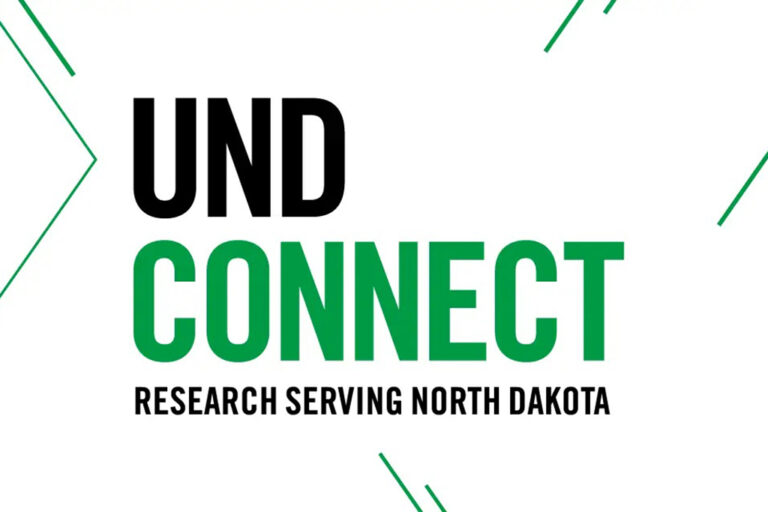More than 340,000 readers worldwide
When they talk about writing for The Conversation, UND faculty authors say great things — and no wonder

In the year that has passed since UND entered into a partnership with The Conversation, hundreds of thousands of people around the world have read articles by UND faculty authors — and those authors report having “outstanding” experiences in working with the publication.
The Conversation is a nonprofit, independent news organization “dedicated to unlocking the knowledge of experts for the public good,” as the organization’s website states. “We publish trustworthy and informative articles written by academic experts for the general public and edited by our team of journalists.”
Last year, UND joined UCLA, the University of Iowa, Ohio State, the University of Washington and some 80 other universities in partnering with The Conversation. Since then, 13 UND scholars have written articles for The Conversation, and those articles have been read a total of more than 340,000 times.
Much of that attention is due to the organization’s Creative Commons license, which allows articles from The Conversation to be republished by news organizations around the world.
UND administrators spoke highly of the University’s partnership with the publication, and the opportunity it creates for University academics to gain visibility as public experts providing insight on topics that matter worldwide.
“The Conversation has proven a wonderful opportunity for UND faculty to share their expertise with the world,” said Provost Eric Link. “To date, more than a dozen UND faculty have written articles for The Conversation that have reached, collectively, hundreds of thousands of people across the globe — a remarkable achievement.”
Link continued: “Faculty engagement with The Conversation is a good way to bring visibility to the cutting-edge scholarship and innovative ideas to a wide readership. Importantly, it is one of the ways we can demonstrate the world-class faculty members we have here at UND.
“We have no interest in being anyone’s best-kept-secret. Participation in The Conversation is one way we can demonstrate to the larger scholarly community — at a global level — that UND has outstanding faculty members with expertise in their fields who are conducting impactful research and scholarship here in Grand Forks.”
Meloney Linder, vice president of Marketing & Communications, agreed.
“We started our partnership with The Conversation as a way to increase our national media mentions of our faculty experts at UND,” Linder said. “Its performance has surpassed expectations in the reach of the articles with readers.”
A list of all UND authors can be found on The Conversation’s “University of North Dakota” webpage, along with links to their articles.
Recently, UND Today asked the faculty authors for their feedback, and the following observations typify those submitted. The authors were asked about their experiences working with a Conversation editor, whether they would recommend the publication to their peers, and whether any professional contacts such as media interviews, requests for research collaboration and so on resulted from their articles.
UND Today thanks all faculty members for their valuable assistance in providing feedback.

Laura Link, assistant professor of Teaching & Leadership, said her experience of working with a Conversation editor was “outstanding,” and she “absolutely” would recommend the outlet to her peers. Link said she was invited to appear as a guest expert on the national “Tests and the Rest: College Admissions Industry” podcast, following her article’s publication.
She also noted that her article, “Every teacher grades differently, which isn’t fair,” resulted in her being contacted by K-12 educators from across the nation, as well as by prospective students. In fact, the article even led to increased enrollments in her Mastery Learning Certificate and Master of Science in Teaching & Leadership programs, she said.
“The Conversation provided me a quick and accessible opportunity to showcase my expertise and original research while reaching a broad audience — well beyond the typical academic spaces,” Link told UND Today.
Kumi Nagamoto-Combs, assistant professor of Biomedical Sciences, said she received several encouraging comments from patients who read her article about people with food sensitivities.

Because she is a biomedical researcher who studies the mechanisms of diseases but does not see patients, “comments from actual patients were valuable to me,” she said. “I received a lot of encouraging and reassuring messages from actual patients.”
Nagamoto-Combs also said the publication of her article led to her running experiments on a specific biomarker, after an allergist shared his observations on her research.
Interestingly, she was contacted by the Fargo-Moorhead RedHawks baseball team to provide insight and advice into the team’s creation of a “Peanut Free Night,” an event for food-allergic baseball fans.
In her comments, Nagamoto-Combs offered the only piece of negative feedback that surfaced in UND Today’s survey: the fact that the headline to her story, she felt, was too long. Next time, The Conversation should go over possible headlines with the author before publication, she suggested.

Emily Midkiff, an instructor of Teaching & Leadership, spoke highly of the process of working with her editor for her article, “Sci-fi books for young readers often omit children of color from the future.” Like Link, Midkiff said she appreciated seeing the broad scope of readership of her article. She also discovered that her work has struck a chord with instructors at other institutions:
“I’ve had strangers approach me at conferences to tell me that they teach the article to their undergraduate classes as a taste of research in the field,” she said.
Michael Dodge, associate professor of Space Studies, said he liked the way his article about NASA launches turned out, and that, as a first-time Conversation author, he asked a lot of questions of his editor to get the article into that final form.
Dodge said his interactions with media have increased, including a recent interview about UFO’s, which was “odd but fun,” and that publishing in The Conversation offers insight into how he approaches his students.
“I would certainly recommend publishing with The Conversation to my peers, as it’s a good experience in learning to communicate with an audience outside of the norm for us, which strengthens our ability to teach our students,” he said.

Johannes Van der Watt, research assistant professor with the College of Engineering and Mines, had the opportunity to write about hydrogen, and the role the noble gas might play in being a solution to climate change. Like others, it was Van der Watt’s first time publishing in The Conversation.
Also like others, he said he appreciated the input from his editor in crafting the final version of the article, and that he would encourage his peers to seek out publishing opportunities with the outlet. Publishing with The Conversation, he said, also led to a change of perception when it comes to communicating about his own research.
“It allowed me to think about how one explains a foreign concept quickly and concisely,” he said. “It has helped me to talk to the average person on the street more easily and get them excited about science and engineering.”
****
Faculty members and graduate students who’d like to write for The Conversation are invited to read Introducing The Conversation, a UND Today article from last fall, and Ten thousand readers in nearly 150 countries, a story in which Professor Rebecca Rozelle-Stone recounts her own experiences with The Conversation.
UND Today writers are happy to provide more information. As a further resource, The Conversation has put together an Author’s Handbook that provides detailed guidance.




